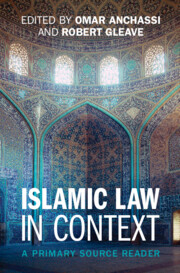Book contents
- Islamic Law in Context
- Islamic Law in Context
- Copyright page
- Contents
- Acknowledgements
- Contributors
- Introduction
- Part I Islamic Legal Theory (Uṣūl al-Fiqh) and Related Genres
- Part II Islamic Jurisprudence (Fiqh) and Related Genres
- Part III Legal Opinions (Fatwās)
- Part IV Court Judgments and Other Court Documentation
- Part V Judicial Manuals and Reference Books
- Chapter 31 Introduction to Part V
- Chapter 32 ‘The Discretion of the İmâm’
- Chapter 33 On Criminal Law
- Chapter 34 Custody Disputes and the Best Interests of the Child, from al-Murshid fī l-Qaḍāʾ al-Sharʿī (2008) by Qāḍī Iyad Zahalka
- Chapter 35 Ibn Khunayn (b. 1376/1956) on Adjudication and Judicial Organisation, from al-Kāshif fī Sharḥ Niẓām al-Murāfaʿāt al-Sharʿiyya al-Saʿūdī
- Chapter 36 Temporary Marriage in Iranian Family Law
- Chapter 37 On Scriptuaries and Pagans as Slave-Concubines
- Part VI Alternative Sources for Islamic Legal Studies
- Name Index
- Subject Index
- References
Chapter 37 - On Scriptuaries and Pagans as Slave-Concubines
An Excerpt from the IS Publication al-Sabī: Aḥkām wa-Masāʾil of Turkī al-Binʿalī (d. 1438/2017)
from Part V - Judicial Manuals and Reference Books
Published online by Cambridge University Press: 14 November 2024
- Islamic Law in Context
- Islamic Law in Context
- Copyright page
- Contents
- Acknowledgements
- Contributors
- Introduction
- Part I Islamic Legal Theory (Uṣūl al-Fiqh) and Related Genres
- Part II Islamic Jurisprudence (Fiqh) and Related Genres
- Part III Legal Opinions (Fatwās)
- Part IV Court Judgments and Other Court Documentation
- Part V Judicial Manuals and Reference Books
- Chapter 31 Introduction to Part V
- Chapter 32 ‘The Discretion of the İmâm’
- Chapter 33 On Criminal Law
- Chapter 34 Custody Disputes and the Best Interests of the Child, from al-Murshid fī l-Qaḍāʾ al-Sharʿī (2008) by Qāḍī Iyad Zahalka
- Chapter 35 Ibn Khunayn (b. 1376/1956) on Adjudication and Judicial Organisation, from al-Kāshif fī Sharḥ Niẓām al-Murāfaʿāt al-Sharʿiyya al-Saʿūdī
- Chapter 36 Temporary Marriage in Iranian Family Law
- Chapter 37 On Scriptuaries and Pagans as Slave-Concubines
- Part VI Alternative Sources for Islamic Legal Studies
- Name Index
- Subject Index
- References
Summary
This chapter concerns the 1435/2014 IS booklet on slave-concubinage, al-Sabī: Aḥkām wa-Masāʾil, probably authored by the group’s jurisconsult (muftī), Turkī al-Binʿalī (d. 1438/2017). The text was widely disseminated online when first published, attracting much comment in the international press. In the section excerpted here, al-Binʿalī focuses on the permissibility of taking female pagans as slave-concubines. While premodern Sunnī jurists had typically permitted female People of the Book (i.e. Kitābiyyāt, Jews and Christians) as sexual partners for male Muslims living in the Muslim polity, whether through marriage or slave-concubinage, they were almost unanimous in prohibiting such unions with Zoroastrians and other religious groups. Based on largely historical considerations, and adducing the views of Ibn Taymiyya (d. 728/1328), Ibn al-Qayyim (d. 751/1350) and al-Shawkānī (d. 1250/1834) as proof, al-Binʿalī undermines the classical Sunnī view that female pagans are unlawful as slave-concubines.
Keywords
- Type
- Chapter
- Information
- Islamic Law in ContextA Primary Source Reader, pp. 384 - 396Publisher: Cambridge University PressPrint publication year: 2024

